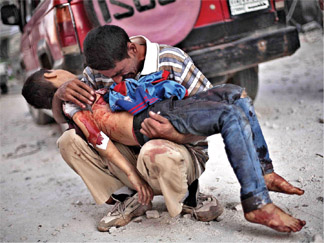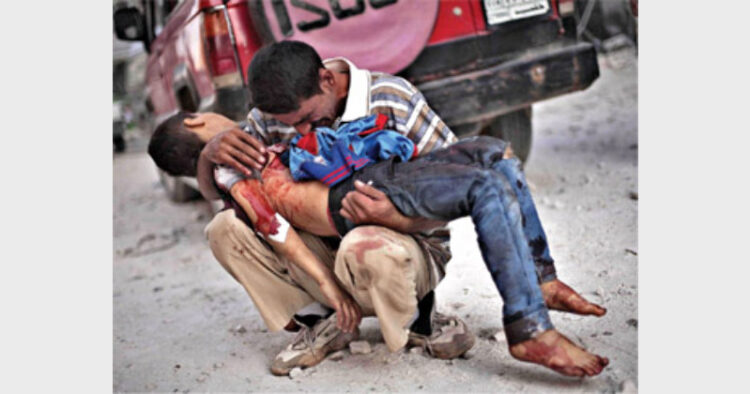 The use of chemical weapons has been causing a humanitarian crisis in Syria. The agencies and actors of the world are active to end it. But it does not seem to be ending. It is leading to a further crisis situation
The use of chemical weapons has been causing a humanitarian crisis in Syria. The agencies and actors of the world are active to end it. But it does not seem to be ending. It is leading to a further crisis situation
Dr Rajiv Nayan
The air dropping of chemical weapons on a section of the Syrian population, which apparently killed around 100 persons, including women and children, and which subsequently, witnessed the US reaction (firing 59 Tomahawk missiles the very next day), once again brought the use of chemical weapons to limelight.
The incident of chemical weapons use was reported in the southern rural Idleb. In a statement, the World Health Organisation, on the basis of the reports of its health cluster partners, stated that about 70 people had been killed and hundreds had been affected by the air dropping of weapons. Normally, it was reported that nerve agents were used in the April 4 Syrian attack.
The use of chemical weapons in Syria is not new. For several years, allegations and counter- allegations have been on. This led to the involvement of two international organisations—the United Nations (UN) and the Organisation for the Prohibition of Chemical Weapons (OPCW). . One of the press releases of the OPCW informs that “… the FFM [Fact Finding Mission] has confirmed with ‘high degree of confidence’ that Chlorine and Mustards were used as weapons in its investigations into past allegations of chemical weapons use. These reports were submitted to States Parties to the CWC and also transmitted to the UN Security Council.”
On all the occasions, the international organizations would merely confirm the use of chemical weapons, but would not provide conclusive statement about the party that had used it. The task of the OPCW is still not complete. The OPCW’s FFM in Syria has been operating since May 2014.
The FFM has been investigating all the incidents or the allegations of the use of chemical weapons in Syria. It has been informing the State Parties of the Chemical Weapons Convention (CWC) about its findings from time to time. India is also a member of the CWC. In fact, India is one of the first 65 countries that had ratified the Convention and has served on the Executive Council of OPCW as its Chair on a couple of occasions.
What are the nerve agents, which were supposedly used in the Syrian attack on April 4? The nerve agents constitute one of the categories of chemical weapons. There are other categories such as riot control agents and blood agents. The nerve agents were synthesised after the First World War. In the War, the world had witnessed a large scale use of chemical weapons which had resulted in the Geneval Protocol of June 17, 1925. The Protocol Prohibits the “Use in War of Asphyxiating, Poisonous or other Gases, and of Bacteriological Methods of Warfare.” Still, the countries kept using chemical weapons, though many times the allegations remained unverified.
The nerve agent was first synthesised by the German scientists in the 1930s. The German scientists synthesised tabun (GA) and sarin (GB), which were considered the first of the G- series agents. The idea behind the development of nerve agents was to improve chemical weapons. Other G-agents such as Soman (GD) and cyclosarin (GF) were synthesised soon. In the 1950s the British scientists synthesised a more lethal V-series of agents, including the highly popular VX agents.
One of the study papers of the OPCW informs: “Nerve agents like soman inhibit the normal actions of acetylcholinesterase, an enzyme crucial to nervous systems.” These agents create a lump between nerve cells or across synapses and make way in the human body through the skin and lungs. The use of nerve agents results in seizures to loss of body control to death. It paralyses ‘muscles, including heart and diaphragm.’
The OPCW paper divides nerve agents into two main sub-categories: G-series agents and V- series agents. These sub-agents agents got the names earlier in some of the leading countries. The OPCW just continued with the earlier designations. The OPCW paper notes: “Some G-agents, particularly tabun and sarin, persist in the environment for only short periods.
Other agents, such as soman and cyclosarin, persist longer and present a greater threat to the skin. V-agents, in comparison, are extremely potent (only milligrams needed to cause death) and persist for long periods of time on the battlefield.”
The WHO, in one of the statements after the April 4 noted, “dozens of patients suffering from breathing difficulties and suffocation have been admitted to hospitals for urgent medical attention.” As the WHO had prepared this statement on the basis of the information sent by its health cluster partners, its credibility is considered quite high. This has led many to conclude that the choking agents were also used in the Syrian attack. These agents basically attack and hurt the respiratory tract thereby causing irritation in the nose, throat, and especially the lungs. Chlorine, phosgene, diphosgene, and chloropicrin are some of the prominent choking agents. The First World War witnessed the massive use of
these agents.
But the WHO, in the same statement, did underline the use of nerve agents. The paragraph noted: “The likelihood of exposure to a chemical attack is amplified by an apparent lack of external injuries reported in cases showing a rapid onset of similar symptoms, including acute respiratory distress as the main cause of death. Some cases appear to show additional signs consistent with exposure to organophosphorus chemicals, a
category of chemicals that includes nerve agents.”
Undoubtedly, the use of chemical weapons has been causing the humanitarian crisis in Syria. The agencies and actors of the world are active to end it. But it does not seem to be ending. This is leading to a further crisis situation. It does not matter whether a rebel organisation or the government used the weapon. What matters is that it should not occur again. Innocent citizens should not become victims. The ongoing war has already done too much damage in Syria. Not merely the WHO but also International Committee of the Red Cross among many have been expressing concern over the damage of health facilities in persistent bombings.
The damage to the hospitals has already affected the victims of the Chemical weapons attack. Al Rahma Hospital, where the first victim of the attack, apparently reached, was not in a position to give treatment to the victim. Even one of the main hospitals of the region, had its entire infrastructure damaged in the ongoing bombings in the war/conflict. The hospitals of the area were without normal medicine, leave alone the drugs which are administered as anti-dote. Even required support took time to reach. Later WHO managed medicines like Atropines and steroids for the treatment of the patients. Other neighbouring countries also came to assist victims notwithstanding the politics played after the American bombings.
(The writer is a Senior Research Associate Institute for Defence Studies and Analyses)














Comments